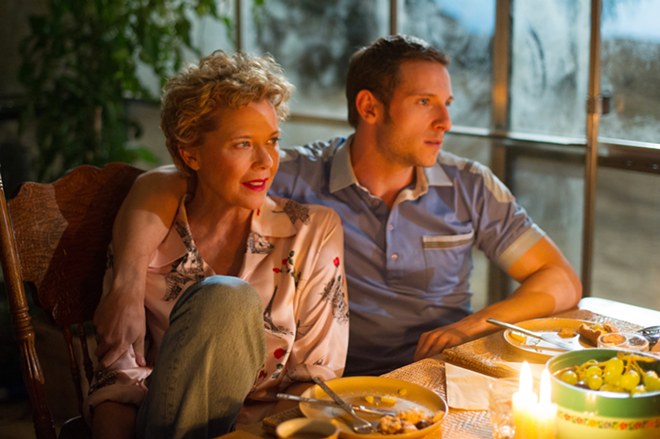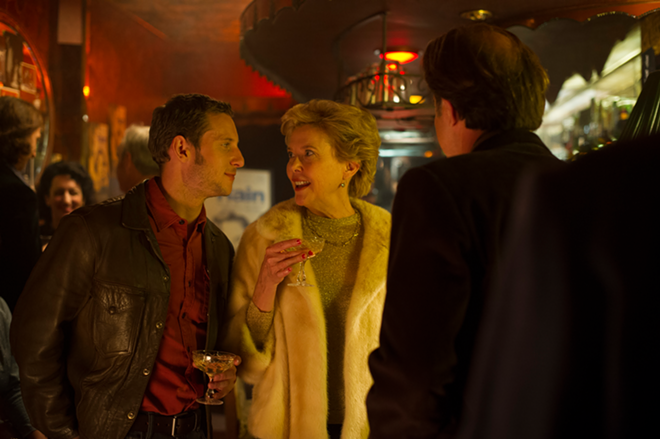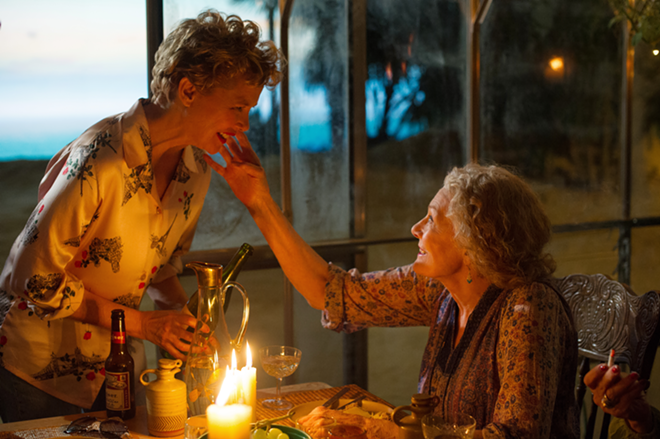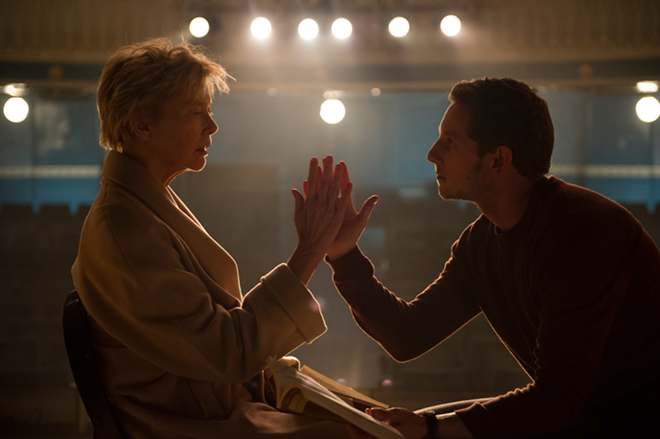
I was determined not to cry in this movie. I knew I was tougher than an over-sentimentalized love story of an unlikely pairing between a 20-something Liverpool waiter/actor-wannabe and an aging star who had left ingenue roles long, long, long ago. I was confident I would not be swept away by the syrupy and gauzy lighting of his young taut flesh against her, ahem, gravity-descending skin. I thought my heart would be hardened for a woman whose lover is younger than her own four adult children, a woman who is an out-of-control cocktease on steroids. I didn't want to give up a wintry, sunny day to sit inside and watch a dreary, dour movie whose outcome was already a given by its true-story cancer-ward reality.
I was determined to keep my critical faculties intact throughout this five-handkerchief weeper. My mind and body would stand strong against the mawkish and maudlin. I would not be manipulated.
I failed.
I came, I saw, I wept.
Annette Bening as the 1940s/50s Hollywood star Gloria Grahame and Jamie Bell as her Liverpudlian-stud-muffin Peter Turner are both absolutely terrific. The chemistry — and biology and physics — works for this eleventh-hour, May-December, last-gasp romance.
Director Paul McGuigan’s biopic, Film Stars Don’t Die in Liverpool, has a screenplay by Matt Greenhalgh based on the real-life Peter Turner and his 1986 memoir by the same title. It's Turner's story of his improbable romance with a woman three decades older — he was 24, she was 56 —and worlds apart.
Gloria Grahame was once a Hollywood star. When you watch It’s a Wonderful Life every Christmas, you see this blonde bombshell playing Violet. Grahame was nominated for an Oscar for her supporting role in Crossfire (1947) and received the Oscar for her supporting role in The Bad and the Beautiful (1952). Though famous for her femme fatale roles in various noir pictures, she also played humor and spunk in the role of Ado Annie, the "girl who can't say no" in the film version of Oklahoma. It brings a certain frisson of recognition when later in the Liverpool movie, Peter says to her that he's just a boy who can't say no.
But Grahame never made it to full-blown stardom, finally relegated to stage roles and wandering the boards in dismal old England. Here she met Peter who was rooming at the same boarding house, a young and naive waiter and aspiring actor himself. From such unlikely beginnings comes true love, or as true as anything can be between a man and a woman — both of whom admit to having had both boyfriends and girlfriends — from disparate universes and a 30-year age difference.

She’s there to appear in the play Rain (1979), and when Peter asks what's it about, she tosses off “Sex, sin, salvation, just another day in the life of Gloria Grahame.” As they walk into an room of adoring fans after her stunning theatre performance, she turns to her boy-toy, and in her own words with shrugging indifference, boasts that “Everybody here wants to fuck me.” Peter joins the queue, and together they find some sort of co-dependent love between the starstruck and the starfuck.
Drama and overwrought melodrama abound in their on-again, off-again maneuvering. Flashbacks move us backward and forward as we shift location from gray England to sun-drenched California to glitzy Las Vegas to neon-lit New York. But our base is Liverpool. That famous observation from A Chorus Line that said suicide in Buffalo was redundant could equally pertain to suicide in grim, grimy Liverpool. And the line reputedly attributed to Oscar Wilde as his final words — “Either the wallpaper goes or I do” — could certainly be applied to the set design here with the hideous wallpaper of huge cabbage roses and fighting geometrics and florals.
Was there ever a better cinematic metaphor for conflicted relationships than lurid wallpaper?
The time frame is fractured and conflicted as much as the location and the wallpaper. We shift and slip from 1981 Liverpool to 1979 Liverpool, then to 1979 California, then to New York, finally to 1983 Liverpool. Peter leaves one door in 1981 and walks through another door in 1979. There are multiple instances of such smoothly edited transitions between times and places. And also a remarkable scene of their New York break-up, or rather two scenes, for we see it first from Peter's perspective, then again from Gloria's point-of-view.
It works.

In their California sojourn, the star shows the boy the moonlit ocean from her beachfront cottage and introduces him to her family. It’s a fantastic self-contained piece of drama and acting bravado where her mother (Vanessa Redgrave) huskily conjures Shakespeare and her sister (Frances Barber) bitchily reminds the lovely couple that Grahame has had four husbands, one of which was her stepson whom she had first slept with when he was 14.
The time is fractured, the memories are fractured, the romance is fractured.
Years later, Gloria makes one last trip to England for one more stage performance — what shall it be? Blanche Dubois who preys on high school boys from A Streetcar Named Desire? Amanda Winfield who bludgeons her children with self-sacrifice and guilt in The Glass Menagerie? How about Medea where the mother slaughters her children and feeds them to her ex? — but she collapses before curtain time. She makes a desperate call to her now-ex Peter and begs him to take her to his family home in Liverpool where she’ll be watched over and cared for by Peter’s mother (Julie Walters), a plucky, tart-tongued angel. Glamorous Hollywood and working-class Liverpool meet in that terraced house and none of Peter's family (father, mother, brother) will ever be the same.
As she gets sicker and weaker — the passion bed now the deathbed — he remembers what once was theirs. What once had been so easy, so light, so honeymooned in its intensity has become fraughted and freighted by the real world bearing down. What once had been milk drunk from a champagne flute and stilettos tossed on a hotel room floor has become a prolonged and painful death.
The final scene — Gloria and Peter together on the stage for one last performance, a brief read-through of Romeo and Juliet — will break your heart.

Like I said, a five-handkerchief weeper of a movie.
Why hasn’t Annette Bening gotten an Oscar in her extensive career instead of a mere nomination?
Why hasn't Jamie Bell had a leading-man romantic role, rather than just dropping off the planet after his electrifying success as the 11-year-old title character in Billy Elliott?
These two actors could make me believe anything, no matter how pathetic, bathetic even, the subject material. Bell should be a beefcake star with his expressive face and dazzling performance. Bening has never been better — subtle, demonstrative, vulnerable, overpowering, glamorous, raw.
Just get rid of that clumsy, clunky title. Even if it is the title of the Peter Turner memoir. For most of us, Liverpool is Beatles country, so I think that would be a fine place for a film star to die.
Besides, a better title would be Undying Love. Or Love Never Dies. Both of which are taken.
Ben Wiley is a retired professor of film and literature at St. Petersburg College. He also was on staff in the Study Abroad Office at University of South Florida as statewide Director of the Florida Consortium/University of Cambridge (UK) International Summer Schools. His interests are in film, books, theatre, travel, literacy programs and kayaking Florida rivers. Contact him here.


